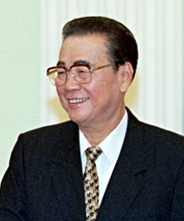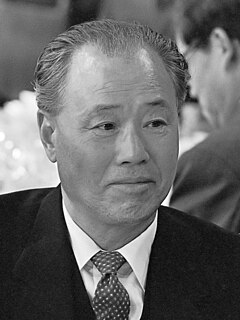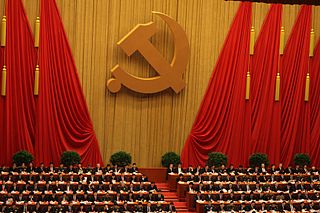
Li Peng was a Chinese politician. Known as the "Butcher of Beijing" for his role in the Tiananmen Square Massacre, Li served as the fourth Premier of the People's Republic of China from 1987 to 1998, and as the Chairman of the Standing Committee of the National People's Congress, China's top legislative body, from 1998 to 2003. For much of the 1990s Li was ranked second in the Communist Party of China (CPC) hierarchy behind then Party General Secretary Jiang Zemin. He retained his seat on the CPC Politburo Standing Committee until his retirement in 2002.

The Standing Committee of the Central Political Bureau of the Communist Party of China, usually known as the Politburo Standing Committee (PSC), is a committee consisting of the top leadership of the Communist Party of China. Historically it has been composed of five to eleven members, and currently has seven members. Its officially mandated purpose is to conduct policy discussions and make decisions on major issues when the Politburo, a larger decision-making body, is not in session. According to the party's Constitution, the General Secretary of the Central Committee must also be a member of the Politburo Standing Committee.

Zhao Ziyang was a high-ranking statesman in the People's Republic of China (PRC). He was the third Premier of the People's Republic of China from 1980 to 1987, Vice Chairman of the Communist Party of China from 1981 to 1982, and General Secretary of the Communist Party of China from 1987 to 1989. He was in charge of the political reforms in China since 1986, but lost power in connection with the reformative neoauthoritarianism current and his support of the Tiananmen Square protests of 1989.
The orders of precedence in China is the ranking of political leaders in China for the purposes of event protocol and to arrange the ordering of names in official news bulletins, both written and televised. It is also sometimes used to assess perceived level of political power. Although there is no formally published ranking, there is usually an established convention and protocol, and the relative positions of Chinese political figures can usually be deduced from the order in meetings and especially by the time and order in which figures are covered by the official media.

Yang Shangkun was President of the People's Republic of China from 1988 to 1993, and was a powerful Vice Chairman and Secretary-General of the Central Military Commission under Deng Xiaoping. He married Li Bozhao in 1929, one of the few women to participate in the Long March, as did Yang.

The Central Secretariat of the Communist Party of China is a body serving the Politburo of the Communist Party of China and its Standing Committee. The secretariat is mainly responsible for carrying out routine operations of the Politburo and the coordination of organizations and stakeholders to achieve tasks as set out by the Politburo. It is empowered by the Politburo to make routine day-to-day decisions on issues of concern in accordance to the decisions of the Politburo, but it must consult the Politburo on substantive matters.

Chen Yun was one of the most influential leaders of the People's Republic of China during the 1980s and 1990s. He was also known as Liao Chenyun as he took his uncle's family name when he was adopted by him after his parents died. He was one of the major political leaders of China both during and after the Chinese Civil War along with Mao Zedong, Liu Shaoqi, Zhou Enlai, Zhu De and Ren Bishi and was later considered to be one of the Eight Elders of the Communist Party of China. In the 1980s and 1990s, Chen Yun was regarded as the second most powerful person in China after Deng Xiaoping.
Since both the Communist Party of China and the People's Liberation Army promote according to seniority, it is possible to discern distinct generations of Chinese leadership. In official discourse, each group of leadership is identified with a distinct extension of the ideology of the party. Historians have studied various periods in the development of the government of the People's Republic of China by reference to these "generations".

Li Xiannian was the President of the People's Republic of China between 1983 and 1988 and then Chairman of the Chinese People's Political Consultative Conference until his death. Li was an influential political figure throughout the PRC, having been a member of the Politburo of the Communist Party of China from 1956. He rose to prominence in the Communist Party of China in 1976, when Hua Guofeng succeeded Mao Zedong as Chairman of the Communist Party of China. At the height of his career in the 1980s, Li was considered one of the most influential architects of China's economic policy after the Cultural Revolution, and is considered one of the Eight Elders of the Communist Party of China.

The Chairman of the Central Committee of the Communist Party of China was the head of the Communist Party of China (CPC). The position was established at the 8th National Congress in 1945 and abolished at the 12th National Congress in 1982, being replaced by that of the General Secretary. Offices with the name chairman of the Central Executive Committee and chairman of the Central Committee existed in 1922–1923 and 1928–1931, respectively.

Wan Li was a Chinese Communist revolutionary and politician. During a long administrative career in the People's Republic of China, he served successively as Vice Premier, Chairman of the Standing Committee of the National People's Congress (NPC), and a member of the Communist Party of China (CPC) Secretariat and its Politburo.
Hu Qili is a former high-ranking politician of the Communist Party of China (CPC). He was a member of the Politburo Standing Committee and a member of the Secretariat between 1987 and 1989. In 1989, he was purged because of his sympathy toward the students of the 1989 Tiananmen Square protests and his support for General Secretary Zhao Ziyang. However, he was able to get back into politics in 1991. In 2001, he was named chairman of the Soong Ching-ling Foundation.

Song Renqiong, born Song Yunqin, was a general in the People's Liberation Army of the People's Republic of China (PRC) and one of the Eight Elders of the Communist Party of China.
The 12th Politburo of the Communist Party of China was elected at the 1st Plenary Session of the 12th Central Committee on September 13, 1982, consisting of 25 members and 3 alternate members. It served until 1987. It was preceded by the 11th Politburo of the Communist Party of China. This politburo was reorganized in September 1985, with a retirement of senior members and election of new members. It was succeeded by the 13th Politburo of the Communist Party of China.
The 11th Central Politburo of the Communist Party of China was elected at the 1st Plenary Session of the 11th Central Committee on August 19, 1977, consisting of 23 members and 3 alternate members. There were additions to the membership in 1978 and 1979. It served until 1982. It was preceded by the 10th Politburo of the Communist Party of China.
The 13th Central Committee of the Communist Party of China was in session from 1987 to 1992. It held seven plenary sessions. It was preceded by the 12th Central Committee and succeeded by the 14th Central Committee. It elected the 13th Politburo of the Communist Party of China in 1987.
The 12th Central Committee of the Communist Party of China was in session from September 1982 to November 1987. It held seven plenary sessions. It was securely succeeded by the 13th Central Committee.

The 18th National Congress of the Communist Party of China began on November 8, 2012 at the Great Hall of the People. It was preceded by the 17th National Congress of the Communist Party of China. Due to term and age limits restrictions, seven of the nine members of the powerful Politburo Standing Committee (PSC) retired during the Congress, including Hu Jintao, who was replaced by Xi Jinping as General Secretary of the Communist Party of China. The Congress elected the 18th Central Committee of the Communist Party of China, and saw the number of Politburo Standing Committee seats reduced from nine to seven. It was succeeded by the 19th National Congress of the Communist Party of China.
Yao Yilin was a Vice Premier of the People's Republic of China from 1979 to 1988, and the country's First Vice Premier from 1988 to 1993.
The Tiananmen Square protests of 1989 were a turning point for many Chinese officials, who were subjected to a purge that started after June 4, 1989. The purge covered top-level government figures down to local officials, and included General Secretary Zhao Ziyang and his associates. The purge took the form of a massive ideological campaign that lasted 18 months. At least 4 million party members were under some sort of investigation. The government stated that the purge was undertaken for the purpose of “resolutely getting rid of hostile elements, antiparty elements, and corrupt elements" as well as "dealing strictly with those inside the party serious tendencies toward bourgeois liberalization” and purify the party.











